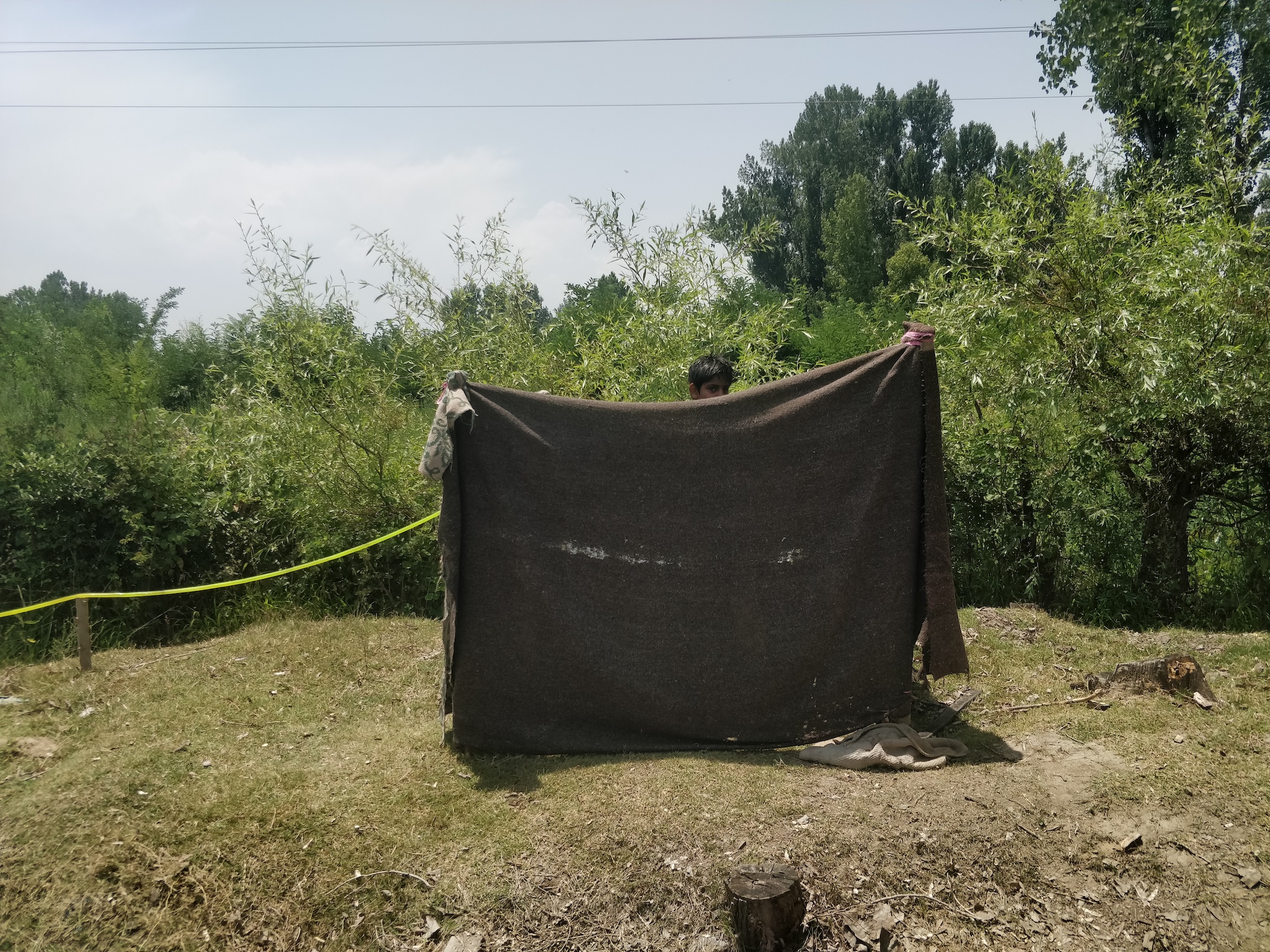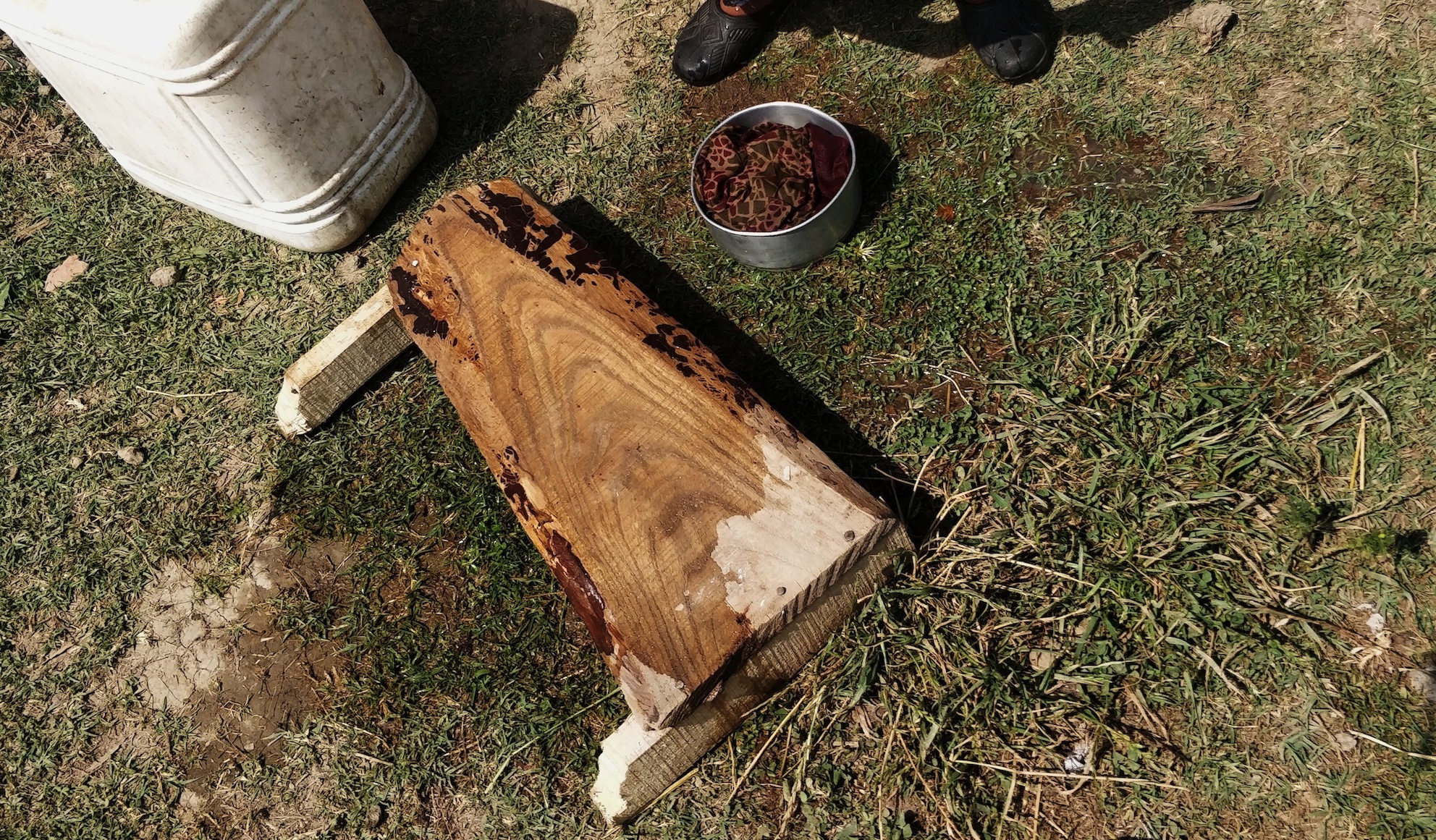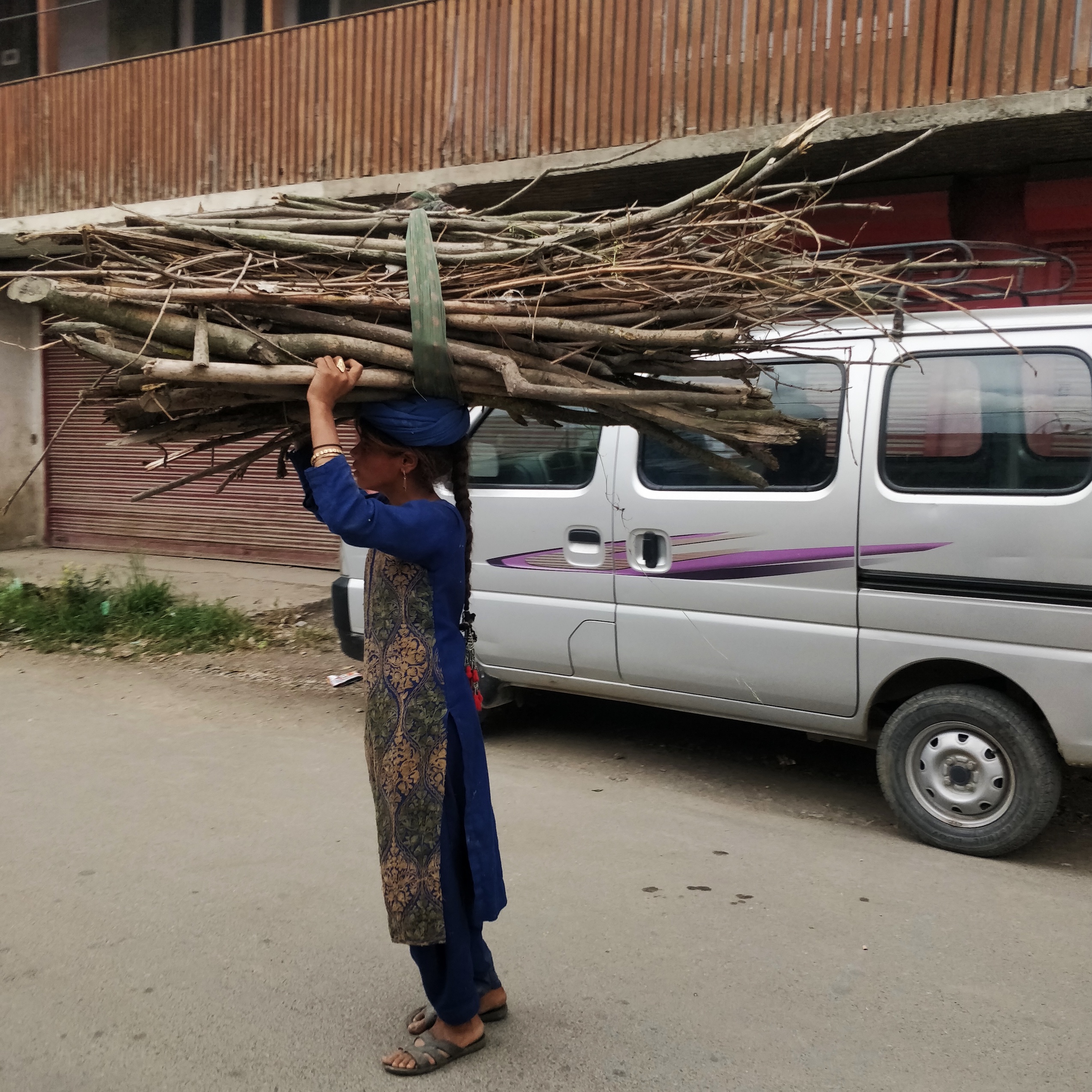When it comes to healthcare awareness, the pastoral Bakarwal community is the most-ignored tribal community in Jammu and Kashmir. For most of the year, the members of this pastoral community keep travelling from one place to another in search of grazing grounds for their livestock.
This is a community that is known for its strong women, who travel shoulder to shoulder with their men. Sustaining the greatest hardships of tribal life, they have to suffer a pernicious state of menstrual and postpartum health.

Temporary housing of a nomad family on the outskirts of Srinagar. Photo: Mashkoora Khan
Pregnancy is often considered a difficult time for any woman. However, for a tribal Bakarwal woman, who is always travelling, the pain and agony is almost unimaginable. Many of these tribal women lose their young ones before they are born because of the perilous nature of carrying a baby in your womb and treading miles every day.
Rubeena, 33, from Kalakot, travels every year to Kashmir with her family, but this time she was expecting her second child. After days of travelling, Rubeena, along with her family and flock of sheep, arrived at Gulab Bagh, Srinagar. When she finally had some time to rest, she fell sick. Still, Rubeena sat down and started preparing a meal for her family. But soon her whole body started shaking.
“I abruptly started feeling shaky. I consulted my mother. She told me it happens during pregnancy. As it was my second time carrying a newborn, I was sceptical that my husband would take me to a hospital. However, he took me to a local hospital,” she said. For Rubeena and her husband, visiting hospitals is a rare event. Many within the community don’t understand the way in which hospitals work.

Temporary bathroom of the nomad family, covered with old blanket covers/Photo: Mashkoora Khan
“We had never been to the hospital in this situation so we hardly knew what to do. After doing the necessary formalities, we were told to take up some tests. After getting the test reports, we came to know that I am going to give birth to twins this time. I started sobbing and wishing that I would not give birth to twin girls. For boys, the world is a bit easier. Girls can only cook at home for male members.”
Despite being in her seventh month of pregnancy, Rubeena still works the way she used to because she has to cook for her family. Her husband works the whole day as the breadwinner. Rubeena was not aware that she was carrying twins and continued climbing the upper reaches and carrying firewood on her head. Such harsh physical work could bring dangerous consequences for Rubeena and her twins. Though the doctor had advised Rubeena to take complete rest, however, Rubeena could hardly do that as she is the sole woman in her family.
“We don’t get time to rest during pregnancy or after pregnancy. We travel side by side with our men. Taking a 40-day rest is near impossible for tribal women. Taking regular baths after the delivery is next to impossible as we have to huddle ourselves together for work and take our herd of sheep to graze every single morning. We get to bathe only once in a four days,” Rubeena said.
Apart from pre and post-partum problems, the menstrual cycle is another battle that tribal women have to face each month. Having no knowledge of sanitary pads, many tribal women still use pieces of worn-out cloth that they wash and reuse. Most don’t even know about the harsh consequences of reusing the same piece of cloth.
Also read: ‘Sacred Stains’: A Sneak Peek Into the Dark Corners of Menstruation
Life is tougher for unmarried girls like Fatima. Among Kashmiri tribals, earning a livelihood is far more important than going to a school. Fatima, 21, who is also from Kalakot, had to quit school just to make sure that she earns her bit by travelling to the new grazing fields of Kashmir along with her family. Fatima’s extreme shyness and hesitation made it difficult for her to talk about her menstrual cycle.
“I was 14 when I had my first period and wasn’t aware of what was going on. I was frightened and didn’t tell anyone because I believed I was pregnant. I couldn’t even ask my mother for some cloth. I just went outside and collected some leaves to clean the menstrual blood. When I changed my dress after two days, my mother saw red blood tints on my clothes.”

Fatima’s set-up to wash her menstrual cloth during her cycle. Photo: Mashkoora Khan
“I started sobbing and cried out of the hesitation. I didn’t know what to say. My mother grabbed my hand and offered me a piece of old cloth. She also taught me how to use the cloth. She advised me to use the cloth and wash them when no male family members were around, which I am still obeying. When I wash my menstrual clothes, I hide them in firewood till those clothes dry.”
Apart from this, there are other taboos attached to the menstrual cycle among the tribal Bakarwal communities which they have been following through the centuries.
“During periods we cannot cook for our family nor can we touch utensils. We are assumed to be unclean and are not permitted to sit near the kitchen. We are being told by our mother not to talk about menstrual pain.”
“For their misery, we can’t even rest during their menstrual cycle just to make sure that nobody in the family gets a reason to doubt or speculate anything about our menstrual periods,” said Fatima. “We cannot touch cold water. We cannot look in the mirror because we will get pimples on our faces. We don’t even comb our hair as it is felt in our community that combing our hair can prolong our menstrual cycle.”
Most of the women going through their menstrual phase have to play it normally and do their daily chores.
“Even when we have got twitches in our stomach, we still have to travel. No day is different for us. We act strong just not to let anyone learn about our periods,” Fatima said.
Most of the tribal women don’t know about sanitary pads and underwear. While asking Fatima about the sanitary pads she responded with her eyes down, “First, we don’t use sanitary pads because we cannot afford them. Second, we are afraid of using sanitary pads because their colour is white and the stains will be visible. We will use whatever our mothers use. One sanitary pack cost Rs 30, which is a huge amount to pay. How can one spend money on sanitary pads when one doesn’t have money to buy food?”
Also read: The Cost of Your Periods
While taking notes on the health system in Kashmir, we spoke to Dr Mir Mushtaq, the media spokesperson of the Directorate of Health Service Kashmir (DHSK). “Many things have been done to upgrade the health care system in Kashmir, particularly in rural areas. In every village, there are Asha workers. Anyone can go and seek their help. Also, there are health and wellness centres that have been opened. As the tribal community keeps moving in search of livestock, our hospitals are open to them. Rural health is a priority for the government sector,” he said.
While the world is moving forward when it comes to menstrual hygiene and pregnancy care, it is important to ensure that menstrual hygiene is accessible to more and more women.
Mohammad Fazil is a Kashmir-based freelance journalist. He has worked with bi-monthly newspapers as well as on the national radio in India.
Mashkoora Khan is a freelance journalist. Her work has been published in Milli Gazette, LiveWire, and in many local newspapers and magazines in Jammu and Kashmir.

